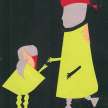
Once upon a time, I was young like you, thought Frances, as a teenager held the door for her at the bookstore. Now, I’m the toad-faced crone, like something out a fairy tale. She was reminded of the Perrault story about a girl whose kindness to an old woman left her enspelled. Every word that fell out of her mouth would be accompanied by precious gemstones. Too bad I can’t cast spells. Make that girl’s day. Or life. She cackled to herself at the absurdity as she put a shopping bag stuffed with new writing supplies into the car.
Frances had always loved fairy tales; those dangling lures that had dragged her into the world of fiction. Charmed by benevolent godmothers and fancy dresses, Frances’s first love was myths and fantasy. It wasn’t just the promises of karmic retribution or goodness rewarded with dripping jewels. She loved the escape. The way underdogs find success in spite of obstacles, giants, and dire straits.
A sucker for plots paved with fortune reversals and unexpected windfalls, Frances had a soft spot for the trope of rich, elderly eccentrics gifting massive sums of money to strangers. There was a time when she read entirely too many of those ridiculous stories. Frances used to dream about such happily ever afters every time she held open a door or carried a bag of groceries. She knew such things only happened in the world of fiction, a fantasy tucked between dog-eared pages. But her overactive imagination never let up, even as she grew up.
When she was in her thirties, recently divorced, she’d found and returned a wallet. It belonged to a writer, not a millionaire. The woman gave Frances a small black notebook as a thank you for her act of kindness. “Put daydreams between the pages,” the woman suggested. “Cast spells inside with a little ink and hope, and see where the tales take you.”
Money was tight back then. Still, after that book was full, Frances justified purchasing a replacement. And another. “I’m not too poor for a fresh notebook and a pencil,” she assured herself. “It’s such a small luxury.” During breaks at the coffee shop, Frances would sit and write, her words flying fast and sloppy onto creamy, unlined pages.
At first, she copied everything: eavesdropped on conversations, noted habits, mannerisms. Soon, she was making up fictions about the people around her, fairy tales featuring average people. No stunning beauties or wicked witches. Instead, the world of her imagination was populated with the coffee shop’s regulars: noisy mothers greeting in a flurry of kisses and soymilk lattes, teenagers on first dates, the gentleman in a tartan cap who came in every Saturday morning, ordered his coffee black and a “cinnamon muffin for my muffin.”
Nothing she wrote was the absolute truth. When she wrote a wife for Muffin Man, the character she imagined was a nervous puff of a woman with crumbs on her shirt, too agoraphobic to visit the coffee shop, yet romanced every weekend with a sweet treat from an adoring lover.
Frances’s stories cobbled together bits and pieces, made up perspectives and angles, manipulated facts. She played with truth, making it fiction. And yet reality often surprised her with its eccentricities, its utter strangeness. There were things even Frances couldn’t make up. On one of her rare weekends off, Frances ran into Muffin Man in the park. He was feeding his muffin, one crumbling bite at a time, to an energetic terrier. From then on, she gave herself permission to be eccentric, to write whatever sprang to mind, no matter how absurd. The truth would always win, anyhow.
Still, Frances didn’t see herself as a writer. That term was reserved for serious people with laptops and publishing contracts. Intimidating people with a thick air of mystery hanging about them, lost in a world of their own. One exception? The critiquers.
Frances had never shown her work to anyone until the day she eavesdropped a little too obviously on a group of women talking about “killing their darlings.” As it turned out, they weren’t suggesting murder, unless it was a sentence or character that didn’t fit the story. Frances took notes. And then…
“I scent a fellow author,” said one, smiling in Frances’s direction. “Are you writing a book there?”
Frances shook her head. “Oh, I’m not really a writer.”
“Someone once told me that a writer is one who writes. Looks like you fit the definition. Might as well own it,” the woman said with a smile. “Write the book. Who knows where it will take you?”
Frances thought back to her shelf at home, laden with black spines, crammed with words.
“I don’t know where to start,” she admitted.
The woman invited her to join them the following week. “Bring something you’re working on.”
For the next few years, the one constant in Frances’s life was her critique group. They encouraged her to send her stories out: to journals, to contests, to agents. Rejections piled up…but so did her manuscripts. Frances killed darlings. She pruned sentences. She went back to the notebooks, dove in for details, made dialogue that sang, characters readers felt they knew.
When her big break happened, people talked about it like she was an overnight success. It wasn’t true. Frances had the notebooks to prove it. But she wasn’t going to explode the myth. People wanted to believe in fairy tales. Frances still had a hard time believing the bidding wars between publishers and generous advances that now padded her bank account. Several books later, she was one of those rare specimens: an author who actually made a living from writing. She was the envy of writers, her younger self included.
After the bestseller, Frances found she had more than she knew how to spend. A lifetime of living frugally does that to a person. It was, she thought, a bit of a shame. What she wouldn’t have given, back then, for the freedom to write? Wasn’t that why she’d always dreamed of a windfall? It wasn’t so she could spend money on jewels and baubles. She’d yearned for the freedom to immerse herself entirely in creativity, to live and breathe art.
Frances drove by the coffee shop where she first met her critique partners, although they no longer met there. Wheels turned in her mind. An idea percolated.
I write fictions all day. Wouldn’t it be nice to make some of them come true? Frances knew it was a preposterous, ridiculous idea, the sort of thing that only happened in books. She wrote it down anyway and added an extra stop to her daily errands.
In the bank parking lot, Frances removed the plastic from one of her earlier purchases. As wonderful as that expandable back pocket in the notebook was, it was clearly not designed to add almost an inch of added paper. Enriching the notebook with an extra two hundred pages was much harder than she’d anticipated. In the end, Frances managed to close the book only after slipping a few colorful elastics around the cover, the bands crisscrossed like a Mondrian painting against its glossy black surface. “Time for a little nostalgia and coffee,” she announced to the empty car.
Latte in hand, Frances sat at a familiar table and waited. When a younger woman came in, ordered the cheapest drink on the menu, and took out a battered spiral-bound journal, Frances smiled. She walked over.
“Another writer, I see,” she said.
The girl looked up. “I’m not really a writer.”
“Someone once told me that a writer is one who writes. But it helps if you have a little more than that.” Frances laid the notebook on the table. “I wish someone had done this for me when I was starting out. Put daydreams between the pages,” Frances suggested. “Cast spells inside with a little ink and hope, and see where the tales take you.”
She walked away before the stunned girl could open it and discover the crisp hundred-dollar bills tucked inside the blank pages. An unexpected windfall, the beginning of a happier after. Twenty thousand dollars might not buy happiness, Frances thought. But that? That was a dream come true.






Comments
There are no comments for this story
Be the first to respond and start the conversation.